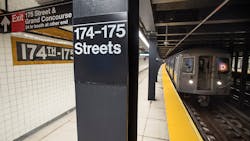The Metropolitan Transportation Authority (MTA) laid out steps it plans to take to reduce costs and implement reform within the authority.
MTA says the steps outlined Feb. 27 will advance the goal of securing the authority's financial future and build on a 10-point plan New York Gov. Andrew Cuomo and New York City Mayor Bill de Blasio outlined earlier in the week.
The steps include:
- Each of the MTA’s operating agencies – including New York City Transit, the Long Island Rail Road, Metro-North, MTA Bridges and Tunnels and MTA headquarters – have submitted consolidation proposals within their agencies. In light of looming deficits, the agencies have been asked to identify $500 million in annually recurring savings. MTA says these are not merely “targets,” but hard, institutional requirements.
- MTA says the same scrutiny will be applied to vendors and contractors by reducing their hourly rates by 10 percent across the board, without cutting the scope of the work they do. This is expected to result in $75 million worth of savings.
- The MTA will be closely reviewing all current and upcoming consulting engagements, with the goal of working toward ending any relationship that is not absolutely and demonstrably necessary. The goal is to cut costs and to ensure a clear focus on high-priority projects and consulting tasks critical to safety, mission-critical needs and agency business goals.
- The MTA will seek to consolidate a slew of back office functions – within operations, between the Long Island Rail Road and Metro-North, in particular, and enterprise-wide. These include accounting, claims, communications, engineering, government relations, human resources, legal, marketing, planning and procurement. The MTA will also consider other, more expansive options at every level.
- MTA says its board and key staff have begun implementing strategies to revolutionize the way it handles procurements, to increase competition and deliver projects more efficiently and effectively – better, faster, and cheaper. As a result, the MTA says it is seeing far more projects delivered on-time and on budget.
- The MTA will work with the state, city and district attorneys to develop an enforcement strategy to combat fare evasions, which costs the agency approximately $215 million per year. The strategy will include both personnel and station design modifications that do not criminalize fare evasion but instead prevent fare evasion, sanction violators and increase enforcement
- MTA officials will continue to work, on an advisory basis, with world class academic experts and other outside innovators on large scale projects, following the successful efforts to avoid a complete L tunnel shutdown. All new major construction projects will be reviewed by construction and engineering experts who are not affiliated with the MTA or its consultants. The construction review team will be headed by the Deans of Cornell School of Engineering and Columbia School of Engineering to assure state of the art design and technology is being deployed. This team, and other academic and independent industry experts, could also potentially contribute to projects like Phase 2 of the Second Avenue Subway Project in East Harlem and the work to install modern signaling systems on several additional subway lines. External academic and technology experts have and will continue to be consulted on the development of infrastructure and technological needs of the new congestion pricing plans.
MTA notes that it is under "significant financial stress" as evidenced by large gaps in its operating an capital budgets.
"Without these cost reductions, in addition to congestion pricing and additional revenue from state and city partners, the agency will be forced to make service and staff cuts, as well as substantially raise fares to help cover capital costs. Not enacting congestion pricing alone would require the MTA to raise fares by nearly 30 percent," the authority explained in a statement.
MTA says it has realized $2 billion in annual recurring savings since 2010 and recently touted its improvement trends, which it credits to maintenance and operational initiatives.
“In addition to the urgency of securing additional revenue, we recognize we must fundamentally reform the MTA,” said MTA Acting Chair Fernando Ferrer. “No more tinkering. No more nibbling around the edges. The MTA’s new leadership team will accept nothing less than large-scale, organizational reform.”
The MTA says it has already taken a number of important steps toward this goal of reducing costs and points to the company-wide hiring freeze for all non-essential employees that was implemented last year. This year, it established an executive committee to ensure that every vacant MTA job is still absolutely necessary before hiring someone new to fill that position.
About the Author

Mischa Wanek-Libman
Group Editorial Director
Mischa Wanek-Libman is director of communications with Transdev North America. She has more than 20 years of experience working in the transportation industry covering construction projects, engineering challenges, transit and rail operations and best practices.
Wanek-Libman has held top editorial positions at freight rail and public transportation business-to-business publications including as editor-in-chief and editorial director of Mass Transit from 2018-2024. She has been recognized for editorial excellence through her individual work, as well as for collaborative content.
She is an active member of the American Public Transportation Association's Marketing and Communications Committee and served 14 years as a Board Observer on the National Railroad Construction and Maintenance Association (NRC) Board of Directors.
She is a graduate of Drake University in Des Moines, Iowa, where she earned a Bachelor of Arts degree in Journalism and Mass Communication.
